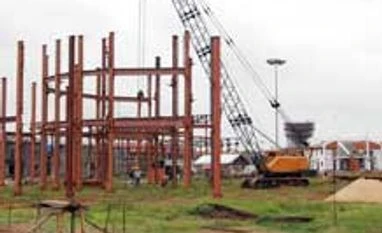Salboni project: West Bengal govt gives ultimatum to JSW
Yet to achieve financial closure for project because of pending draft agreement
)
Questioning JSW's intentions, Partha Chatterjee, West Bengal industry minister, today said if the company continued to dilly-dally, it could be asked to return the land. "I am fed up with the company. It seems they have no intention of taking the project forward. We have waited enough. They have been talking about the iron ore problem. But that is not the state government's responsibility. They are raising one issue after another," Chatterjee said.
JSW Steel Chairman Sajjan Jindal did not respond to the allegations.
For about two years, the state government and JSW have been holding negotiations to resolve issues relating to a supplementary draft agreement. Unless the agreement is signed, the company cannot achieve financial closure for the project.
In 2007, JSW had signed a development agreement for a 10-million tonne steel plant and a 1,620 Mw power plant with the Left Front government in the state at that time. However, after the Trinamool Congress came to power in 2011, it insisted on a supplementary agreement.
In August 2012, the company came close to signing the agreement. However, niggling issues came in the way.
State government officials said the iron ore issue had been resolved after it had agreed to amend the default clause. The amendment ensured lack of iron ore would not lead to the default clause kicking in.
However, there is another issue holding up the project. According to a clause, if the title of the entire land is not clear, the company wouldn't be held responsible for non-completion. JSW is insisting the clause be amended and the word "entire" be deleted, as the land is an agglomeration of several pieces of land.
On whether the government would ask JSW to return the land, Chatterjee said, "Everyone knows that it is our stated policy. We want to communicate this to the company." Jindal is likely to be summoned soon and a meeting might be held next week, depending on Jindal's availability.
Apart from the draft agreement, of the West Bengal Industrial Development Corporation land of 4,300 acres, the lease document for 189 acres hasn't been signed. About 90 per cent of the 4,300 acres, owned by the government, was leased to the company.
Forest clearance issues also remain.
So far, JSW has invested about Rs 600 crore in the project -" in exploration of coal mines and building the township in Salboni. Work on the township is underway.
JSW's relationship with the state government has always been turbulent. The Trinamool government's contention was JSW Bengal had acquired 300 acres directly from landowners, without prior approval from the land reforms department. The Land Reforms Act has a 24-acre cap on land acquisition. After discussions, however, the government decided to take the land with itself and lease it to JSW.
HISTORY OF DISAGREEMENT
A look at how JSW and West Bengal government reached stalemate
SEPTEMBER 2006: Sajjan Jindal revives steel project, on a much larger scale, two years after it was announced
JANUARY 2007: JSW Steel signs development agreement with Left Front government
MAY 2007: JSW gets permission to possess 4,300 acres at Salboni
NOVEMBER 2008: Foundation stone laid
AUGUST 2, 2011: Mamata Banerjee expresses disapproval over project delay
AUGUST 5, 2011: Trinamool Congress government raises questions on land purchase
AUGUST 10, 2011: State government takes land, to lease it back to company
SEPTEMBER 10, 2011: Sajjan Jindal meets Banerjee at Writers Building; CM assures all issues will be settled
NOVEMBER 1, 2011: State government decides to legalise private land acquisition
JANUARY, 2012: JSW signs lease agreement with land reforms department for 3,800 acres
JULY 11, 2012: State government resolves differences, fixes August 9 to sign lease with West Bengal Industrial Development Corporation
AUGUST: 2012: JSW raises concern about iron ore sourcing. JSW is yet to sign the supplementary agreement for the project
More From This Section
Don't miss the most important news and views of the day. Get them on our Telegram channel
First Published: Mar 06 2013 | 12:46 AM IST
